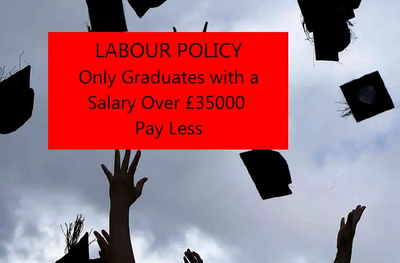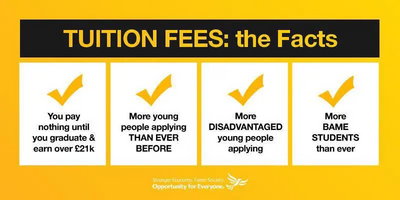Tuition Fees The Facts

A Capped Graduate Tax
Owing to the economic crisis in 2010, the Lib Dems were unable to fulfil their promise not to increase student tuition fees. Nick Clegg has apologised for this musically as well as verbally! The Government finances were so stretched, to keep the fees at the same level would have meant big reductions in university student numbers.or the closure of virtually all Further Education colleges.
At the time, I wrote to Nick Clegg predicting what would happen to Lib Dem popularity if we changed our approach to tuition fees. I was as cross as everybody else that had voted Lib Dem and thought this was a flagship policy. However, since then I have seen the new policy work well in practice, increasing the number of students from disadvantaged backgrounds, improving the funding of our universities and reducing the amount that lower paid graduates pay in tax.
The new system is as close to the 2010 election Lib Dem manifesto policy of a graduate tax as possible. Unfortunately it couldn't be called a graduate tax, as this would have meant students from Europe did not have to repay their fees when they returned to Europe after graduating. If Vince Cable had been able to call it a graduate tax nothing else would have been different for UK students apart from their attitude towards the Lib Dems and our position in the polls!
Under the new system nothing is paid in tax until a graduate is earning over £21,000. Under Labour that figure was £16,000. That makes a big difference to graduates starting out on lower salaries. Although it is packaged as a "student loan", it is actually a formula to calculate a cap on a graduate tax. Only about the top 25% highest paid graduates are expected to reach the cap. The other 75% are not expected to pay off their "loan". After 30 years the "loan" is written off. It's not actually a loan, it's a limit, or "cap" to the amount of graduate tax you pay.

Labour's policy of reducing "tuition fees" just means the students who go on to get the highest paid jobs will reach the cap earlier. Some additional well paid graduates will also reach the cap who wouldn't have reached it before, but for the vast majority of graduates the labour policy of reducing fees to £6,000 will not affect the amount they pay in tax. Money Saving Expert Martin Lewis has an excellent breakdown of the policy and why it will actually only effect those whose starting salary is £35,000 per year and who get above inflation pay rises after that. You can read it in this article, Labour's plan to cut tuition fees to £6,000 is a financially illiterate policy. In it you'll actually get some independent (ie don't take my word for it) detail behind Labour's headline grabbing policy. Also read this article by the Joseph Rowntree Foundation, experts in improving social mobility, who say "If around £3 billion is to be raised from reducing pension relief for the better off, there are many ways it could be used that would have a better effect on disadvantaged young people". They go on to give examples such as the Lib Dem policy of increasing the early years premium. Labour are quite simply offering an election bribe that only benefits the highest paid graduates and threatens higher education funding which has been restored under this government.
Ed Miliband's attitude to reducing "tuition fees" is totally cynical. How can a party that claims to be progressive implement a policy that only helps the richest graduates? He doesn't want to do the right thing, he wants an easy soundbite which make it seem like he is standing up for poorer students. Actually the reverse is true.
DON'T LET LABOUR DESTROY UNIVERSITY FUNDING WITH A POPULIST ELECTION BRIBE WHICH ONLY BENEFITS THE RICHEST GRADUATES.
